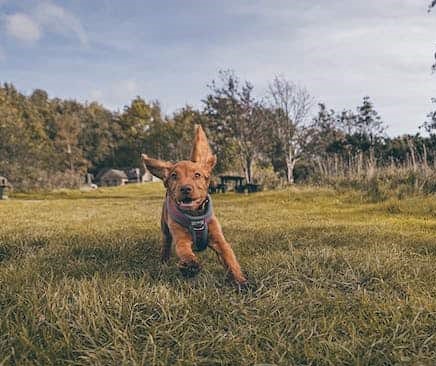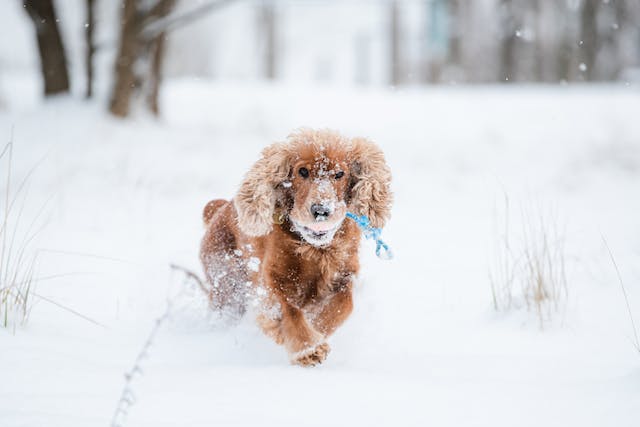Both Springer and Cocker Spaniels are in the top 10 most popular dog breeds in the UK, and it’s easy to see why. Not only do they have charming personalities and unwavering loyalty, but they also have endless amounts of energy. Whether you’re a first-time dog owner or a seasoned expert, there are few breeds that can quite capture your heart like a Spaniel can.

Here are some (of the many!) reasons why we think they make great family dogs. And while Spaniels tend to be very hardy and healthy pets, it’s important to know what to look out for as a Spaniel paw-rent.
| Springer Spaniels | Cocker Spaniels | |
| Average weight | Medium breed: 11-25kg | Medium breed: 10-14kg |
| Life expentency | 12-14 years | 12-15 years |
| Exercise requirements | Very high! | High |
| Temperament | Outgoing and friendly | Gentle and affectionate |
Reason one why we love Spaniels
Spaniels are extremely active, energetic and hard-working dogs. Not only do they need a lot of physical exercise but their needs for mental stimulation and attention are also very high. They do well in active households and love human companionship.
Did you know? Spaniels are often used as search and rescue dogs in disasters such as earthquake recovery and in cases of missing persons.
Watch out for: mobility problems
There are a few conditions affecting mobility that Spaniels are at risk of, such as hip and elbow dysplasia, patella luxation and arthritis. Find out more by clicking on the links.

Reason two why we love Spaniels
Spaniels are very intelligent dogs; they are obedient and often fast learners. They are commonly used as sniffer dogs to detect drugs, guns and money.
Did you know? Spaniels are so good at sniffing that they’ve been shown to pick up odours from illnesses such as cancer.
Watch out for: eye problems
While Spaniels have a great nose for sniffing, they can be prone to some eye problems. Conditions such as glaucoma, dry eye and cataracts can develop in this breed. Find out more about these conditions by following the links.

Reason three why we love Spaniels
Spaniels have great temperaments. They make excellent family dogs, as they are loving, loyal and affectionate. Bred for hunting, where they work closely with human companions, they become attached and form strong bonds.
What to watch out for: heart problems
With their loveable nature, Spaniels easily steal the hearts of anyone they come into contact with. It’s important to be aware that Spaniels can be prone to some heart problems (mainly Cockers) and bleeding disorders, such as immune-mediated haemolytic anaemia. Follow the links to find out more.

Reason four why we love Spaniels
They are famous for their good looks! The elegant female lead in the Lady and the Tramp Disney film is a Cocker Spaniel. They are known for their beautiful, silky hair and long ears. Compared to other breeds, Spaniels don’t shed a lot. Generally, springers have low maintenance needs for grooming but cockers needs are slightly higher.
Watch out for: ear and skin problems
Because of their delightful droopy ears, Spaniels can be prone to ear infections and foreign bodies, such as grass seeds. Spaniels can also develop skin allergies and a condition called seborrhoea. Hypothyroidism is known to affect some Spaniels and this can also lead to skin problems.

Reason five why we love Spaniels
Spaniels are graceful and have excellent balance; their love of the outdoors has no bounds. The slip-resistant paws of a Cocker Spaniel inspired the creation of the sole for the first ever boat shoes. So that means, even on those cold winter mornings, they’ll still be extremely keen for a long walk and adventure.
Watch out for: neurological disease
While Spaniels tend to be very sturdy and healthy dogs, there are some conditions associated with the neurological system that they can develop. Intervertebral disc disease, epilepsy, and dementia have all been known to affect Spaniels. Delve deeper into these conditions by following the links.

Tips on caring for your Spaniel
Preventative healthcare
If you own a Spaniel, you are likely to have an active lifestyle. You probably exercise with your dog, take them to doggy day-care or have a dog walker. With their noses constantly on the floor and they’re willingness to get into the next puddle, it’s important to make sure you:
- Keep your dog up-to-date with yearly vaccinations, including kennel cough, and regular parasite control to protect them from infectious diseases
- Take them for a health check once or twice a year to make sure any changes to their health are caught early
- Consider neutering, especially females, if you are not planning to breed from them

What to feed your Spaniel
No matter what breed your dog is, it’s important to feed them high-quality, complete dog food. Supplements shouldn’t be needed unless they have a particular health concern, such as skin or joint disease.
Special care should be taken if you have a working dog, as their energy requirements are much higher.
Obesity can be a problem if your Spaniel is not getting enough exercise and their food intake is not closely monitored.
Tip: the good dog jar
Spaniels are highly trainable and motivated dogs. Not all will be food motivated but if you use treats to reward their good behaviour, it’s important to control the amount to reduce the risk of overfeeding, even if you have a very energetic Spaniel.
The best way to do this is by putting a portion of your dog’s normal food into a jar. We recommend ¼ to ⅓ of their daily portion of food. You can then use this food as a treat when they are being good, whether because you are actively training them or when they are just being good of their own accord.
Giving them treats for free helps in several ways:
- Prevents you from giving human food, overfeeding and reduces the risk of obesity
- Reinforces their bond with you
- Encourages calm and good behaviour
- Can be used as a distraction
Keeping some in your pocket is also a great idea, just to make sure they are always at hand.
Home care for Spaniels
Exercise needs
A Spaniel’s need for exercise varies with age. An adult healthy Spaniel needs vigorous walks, at least 1-2 hours a day if on lead. They benefit from off-lead walks but are known to wander off, usually chasing something fun. So only let them off if you are in a safe place or have a lot of trust in their recall training.
Other ways to use up their energy involve:
- Training: take a bag of treats/food or their favourite toys and teach them all the tricks you can think of.
- Group activities, such as Agility, Fly-ball, and gun-dog training: there are several clubs around the country, but you can also do it by yourself.
- Mental games: Sniffing and scent games will use up a lot of energy. This can be as simple as sprinkling some of their food on a large towel, rolling it up and twisting it and then letting them undo it.

Space
If you have a Spaniel, you know their favourite spot is on the couch next to or on top of you!
So, inside the house, Spaniels tend to cope with small spaces if they have enough exercise opportunities and mental stimulation. They are medium-sized dogs that won’t take up too much space around the house, apart from during any zoomies!
And as much as they love you, they appreciate having their own space. Providing a safe haven with a crate appropriate to their size and in an area of the house they enjoy being in will be hugely beneficial.
Regular hygiene and grooming
Skin
All Spaniels love exploring the outdoors, and due to their size and spirit, getting wet and muddy is hard to avoid.
Washing the mud off will be necessary more often than anyone would like, but you can do this just by hosing down (hopefully with warm water if it’s cold) rather than using shampoo every day. Dogs produce natural oils that keep their skin and coat healthy and shampoos remove this protective layer. We recommend shampooing only once or twice a month for cleanliness purposes. If you do it too often, you might even notice that they become smellier!
Ears
To avoid ear infections, it’s good practice to clean their ears after they have been swimming, even if it is just with a dry cotton pad. If they have a history of ear infections, you’ll need to use an ear cleaner and do it more regularly, weekly or fortnightly.
If you have a hairy Spaniel, you may wish to have them clipped at the groomer. This will be done at the owner’s preference to avoid matted ears and foreign bodies in their fur. It also helps keep them cool in the summer. But hairy Springers will also benefit from regular brushing. If this is something they are not so keen on, distracting them with a lickmat with something tasty always helps. As well as keeping the session short.

Teeth and mouth
Some Spaniels can be avid chewers and will pick up toys, sticks and stones. It’s important to check their mouths regularly. If your Spaniel has bad breath or is eating less than normal, watch out for any foreign bodies stuck between teeth, broken teeth or other teeth problems.
We recommend brushing their teeth regularly with a tooth paste and brush made for dogs.
Good with children
Spaniels are great fun to have around for all ages, but children appreciate their eagerness for non-stop playing.
Be mindful that even though they are patient dogs, often their clever minds worry if they feel they have no escape from being pocked in the eyes or have something up their nose. Please always supervise children when they are near dogs.

Thinking of getting a dog? Remember to do your research when choosing a breeder. The Kennel Club has tips on what to look for and a list of assured breeders.
From their unique qualities, sweet temperaments and energetic personalities, Spaniels really stand out as more than just a pet. By staying informed about potential health issues, Spaniel paw-rents can ensure a happy and fulfilled life for their faithful friends. Spaniels make a great addition to households as devoted companions, bringing joy and warmth to the lives they touch.











